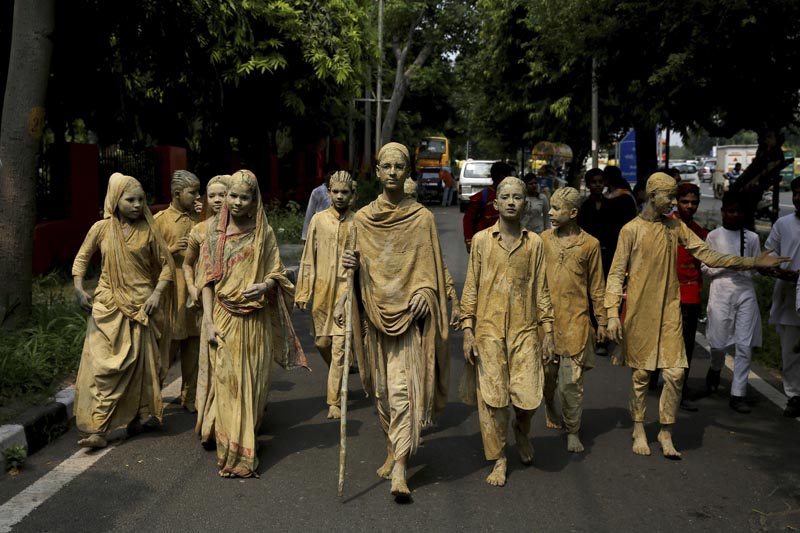India's 2 biggest political parties vie for Gandhi's legacy
GURGAON, INDIA: The ideal candidate, India's oldest political party says on the registration form for an upcoming state election, is a teetotaler who prefers "khadi," home-spun cotton fabrics, in the style of independence leader Mahatma Gandhi.
"It's like an ode to Gandhi on his 150th birth anniversary," said Congress party spokesman Pranav Jha.
India's two biggest parties - Congress and the Bharatiya Janata Party - are tripping over themselves to outdo each other in emulating and celebrating Gandhi, an anti-colonial icon who made Congress into a vehicle for the independence movement.
Both parties have ordered officials to undertake Gandhi-inspired pilgrimages, walking up to 15 kilometres (9 miles) a day in their constituencies and sleeping in villages, beginning on Wednesday, the 150th anniversary of Gandhi's birth and a national holiday in India.
Congress, now the main opposition party, enjoyed decades of popularity after independence but suffered huge losses in the last two general elections. The BJP, the governing party of current Prime Minister Narendra Modi, promotes Hindu nationalism and won a landslide victory in this spring's polls.
While secular, social-democratic Congress seems like the natural heir - Gandhi himself led the party in the 1920s - its recent weak leadership has allowed the BJP to create several splashy Gandhi-inspired programs and co-opt Gandhi's legacy into its Hindu nationalist agenda.
The reason such different parties can lay claim to Gandhi is his complex message, which can get lost in the political mayhem.
Gandhi was the head of India's independence movement, and later the close confidante of India's first prime minister, Jawaharlal Nehru, the Congress party standard-bearer. Nehru and other Congress members wrote Gandhi's dedication to secular pluralism into the country's constitution.
Gandhi bequeathed his last name to Nehru's daughter, Indira, whose family has continued to lead Congress since India achieved independence from British rule in 1947.
But Congress came to the Gandhi game late this year and is struggling to stake an obvious claim because of Modi and the BJP's loud and persistent allusions to, and aggressive co-opting of, the "Mahatma," or great soul, an honorific Gandhi received amid India's independence struggle.
And Gandhi's politics are not clear-cut.
"While he advocated for pluralism, he also believed that religion has a place in Indian politics," said Divya Dwivedi, a philosopher at the Indian Institute of Technology, Delhi.
Mohandas Karamchand Gandhi was a lawyer from Gujarat who successfully campaigned for India's independence from British rule using nonviolent resistance. His face appears on every denomination of the Indian rupee note, and the spinning wheel he made famous lies in the centre of India's flag.
"The reason that every political project must claim to be under the banner of Gandhi is because what defines India today is being anti-colonial," said Dwivedi.
"Gandhi is the one who outlined this anti-colonial project most memorably, so it allows everyone to say that they are party of an emancipatory project," she said.
On Wednesday, the Congress party's interim president, Sonia Gandhi, will lead her own Gandhi-inspired foot-pilgrimage in Delhi from the party headquarters to Mahatma Gandhi's burial place on the Yamuna River.
"Mahatma Gandhi will always remain the guiding light and driving force behind the Congress party," said Pranav Jha, a Congress party spokesman.
Congress is left of centre, secular and social-democratic, and has produced six of India's 14 prime ministers.
"But there is a growing number of voters who don't believe this family is the future of the party," said Gaurav Rathore, a political strategist in Gurgaon, a suburb of New Delhi.
Congress won only 52 of 543 parliamentary seats in this year's general election, compared to the BJP's 303.
"I would not say that Congress has done any soul-searching since the last election," said Rathore. "They don't have any new ideas. They think history and reputation are enough."
The party is just "going through the motions" for the upcoming state-level elections in Haryana and Maharashtra, said Rathore, who predicted Congress losses in both states.
The Congress party's pluralist vision has ceded ground to that of the BJP, which advocates for a more centralised and homogeneous nation. The BJP propagates Hindutva, or "Hindu-ness," as a total way of life and government. In contrast, Mahatma Gandhi was an outspoken proponent of religious, linguistic and ethnic diversity throughout the independence struggle.
Despite this, the BJP proclaims itself "the true inheritor of Gandhi's principles," wrote the BJP's president, JP Nadda.
It's actually not as far-fetched as it seems, given Gandhi's expansive ideology, said Dwivedi.
"Gandhi played a huge role in solidifying the Hindu majority identity in India today," she said. "And his conception of Hindu-Muslim unity meant that each would follow their own faith."
Beyond Gandhi, the BJP has moved in recent years to claim that many of India's founding fathers - including Sardar Patel, the country's first deputy prime minister, and Babasaheb Ambedkar, who was explicitly anti-Hindutva - align with its agenda.
But whether from Congress, the BJP or any other party, much of the modern political engagement with Gandhi is conducted at a surface level: imitating his clothes and long walks, or using visual symbols.
The logo of the Swacch Bharat, or "Clean India," campaign started by Prime Minister Modi is the instantly recognisable image of Gandhi's round eyeglasses.
"Gandhi's name and symbols lend a moral and anti-colonial character to everything," said Dwivedi. But his actual proposals, such as reviving Indian villages and anti-consumerism, are "much harder to follow - for any party."






